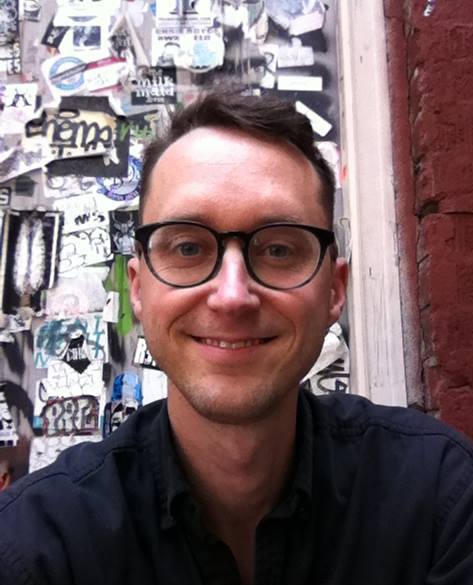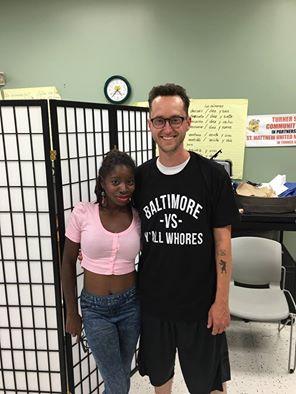I wasn’t sure what to expect while I waited for my interview with Sollers Point director, Matt Porterfield. I had done my research on the Baltimore-based director yet still felt as if I was going in unprepared. Not abnormal for a man who chooses to live beyond the camera lens, I had a hard time finding much information online about Porterfield, but plenty on his previous work.

Sollers Point, a story based on the life of a low-level drug dealer, played by McCaul Lombardi, is Porterfield’s fourth movie filmed in and around Baltimore. His movie Putty Hill garnered much critical acclaim, Roger Ebert gave it 4 out of 4 stars. Porterfield has also filmed Hamilton and I Used To Be Darker in his hometown. With his fourth movie, Porterfield again dares you to look past the scenery and see people, see their stories and challenges you to see things from a point of view you may not have imagined before.
If I told you we were going to see a movie about a Baltimore drug dealer out on house arrest, you’d automatically think it was a hood movie with a majority Black cast. I questioned Matt about that, how he was challenging stereotypes just by making a movie about a white dealer in a place where people are focused on Black thugs. To that all Porterfield could do was laugh slightly as he reminisced about how all the drug dealers he knew growing up were white. It’s movies like Sollers Point that can help bridge the culture gap and put a real face on how society plays a role in why underemployed, damaged people end up in the positions they do.
My first impression of Matt Porterfield was ‘he got game’ as I watched him work up a sweat with a few crew members shooting hoops in the gym that doubled as a staging area. Once we sat down to talk I was all nerves but found that the seasoned director was not only easy to talk to but quite humble as well.
I found myself leaning in to hear him speak, I’m not sure if it’s his normal tone of if he was using one of the tricks of old storytellers to make me listen. No matter the reason I was all ears and boy did I get an earful. I walked out of the interview feeling different like I had met someone special. There are people who work for money and there are people who work from their hearts. Porterfield creates from his heart. A film professor at Johns Hopkins University, Porterfield spends his free time working on his movies, each one challenging you to look deep into the souls of the characters depicted.

TUT: Sollers Point is your fourth film in Baltimore, why do you shoot your movies here?
Porterfield: I’m from here. I love this city, I feel like I learn so much about it, the people that live here, the neighborhoods, through the process of making films. It’s inspiring, so much diversity. I like the geography, we’re on the water and so close to an industrial city but have an urban area too.
TUT: You’ve made Sollers Point, Hamilton, and Putty Hill, these are all areas of Baltimore. You see the people, not necessarily the scenery. How did you come about the story for Sollers Point?
Porterfield: I was thinking about friends of Mine, most of them who had been in prison on drug charges and tried to transition back to the free world and I was thinking that the image of someone who is like literally shackled and confined to a limited amount of space is powerful. I thought I’d tell a story of a guy who was on home arrest, but then living with his dad. I based their relationship on a lot like the relationship with my own dad. I’ve always been interested in shooting n Dundalk, the setting here was important to me. Some of the relationships that Keith has also mirrored some of mine, like the relationship with his grandmother, the relationship with his ex is a lot like a mixture of relationships with a couple of the partners I broke up with.
TUT: Baltimore’s been in the news a lot lately since the riot last year with the stereotype of the Baltimore thugs and drug dealers. You’re kind of challenging stereotypes by making a movie about a white drug dealer in Baltimore, aren’t you? What do you think people will think about you perpetuating the normalcy of a drug dealer in Baltimore and the fact that it goes against the normal.
Porterfield: If I have an agenda as a filmmaker I think it’s like to challenge stereotypes. I just want to depict the diversity of the very broad American middle class. A lot of the guys in my predominately white neighborhood (Hamilton) that sold drugs were white guys. Yet it’s true we hear a lot of fo stories in the media about African Americans. It’s also to humanize a guy involved in an illegal economy. If you’re selling drugs it’s a symptom of a damaged economy, if you’re using drugs that’re a symptom of a damaged society too. I’m not judging the people, I’m trying to look at the situation like they’re human too. It certainly crosses race line, it explores classes.
TUT: Not only do you get to live your dream but you get to live in out in teaching the next generation of filmmakers. What is it like to not only make your own films but to be a part of guiding the next generation of filmmakers?
Porterfield: I hope I not only teach my students the skills of filmmaking but more importantly help them to develop their own aesthetic. Teach them that art is nothing without some ethics behind it. I want to help my students become ethical filmmakers, questions of representation. How the depiction of a human being can either be positive or reinforce negative stereotypes. It’s a valuable position to be in . I feel like I learn as much from them as they learn from Me.
TUT: When did you know you wanted to teach?
Porterfield: Both of my parents are teachers my brother is in academia. I grew up in my parent’s classrooms. I’ve taught younger students in New York and Baltimore. College aged students a good fit for me because they are in great place to learn film. I love it and it also my means of livelihood because movies don’t really pay.Living your dreams is most important. I have a roof over my head, I can feed myself, clothe myself, I spend my free time doing what I love.

TUT: You picked McCaul for the lead role after he appeared in American Honey. How did you decide he was Keith?
Porterfield: When I met him I just really liked him, he was really intelligent and had the right edge. I didn’t know if we were going to find anyone from Baltimore for the role. I was looking for an actor with film experience, I didn’t think an amateur could handle the demands of the production and role. I just felt great when I met him and liked him a lot.
TUT: What do you hope people will take away from Sollers Point?
Porterfield: I don’t know, all my films I think to promote a way of looking at the world openly. I hope they leave the theater thinking about the people on the screen. That they will be thinking about some of the films themes like drugs, recidivism, segregation, addiction, and I hope that they are moved by this character and his story. It’s not the most upbeat story but it will be a good ride. I hope people leave thinking about this character and the decisions we make.
TUT: I have a 16 -year-old at home. I’ve never encouraged him to find a job but to instead find a passion and follow it. What advice would you give today’s youth about chasing their dreams?
Porterfield: Practice. Develop a regular practice of what you love. Do it every day. Read, read up on your craft and develop it. Find a mentor and apprentice with someone whose work they admire with more experience to get hands on knowledge.
I left my interview with Matt feeling like I had just come from an intimate one on one with a close friend. The sit down was therapeutic. In a world of blockbuster films about nothing, remakes of classics and hood movies, it’s refreshing to see someone still making quality films. Films about people, with real stories and real lives. I can’t wait until Sollers Point is released in 2017.

Check out my exclusive interview with Sollers Point star, McCaul Lombardi.












